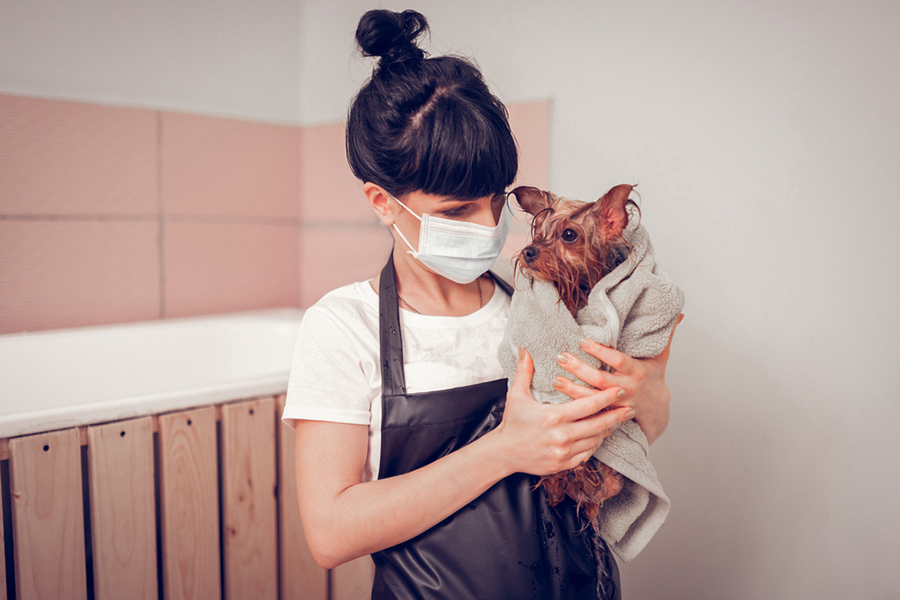
Updated 3/23/2020
COVID-19 is a disease caused by a new coronavirus, SARS-CoV-2, that has not previously been identified. This virus is not the same coronavirus that can cause the common cold in humans, nor is it the same as canine coronavirus (CCoV). Coronaviruses are a family of viruses characterized by crown-like spikes on their surface as seen under the microscope.
There are many viruses in this family that cause various types of diseases, such as diarrhea and upper respiratory infections.
Can my pet be affected by COVID-19?
At this time, there is no evidence that any animal or pet can infect humans with the new coronavirus. Additionally, no animals to date have been reported to be sick with COVID-19.
“At this time, there is no evidence that any animal or pet can infect humans with the new coronavirus.”
Can my dog be affected by COVID-19?

As of March 23, 2020 – There has been a report from Hong Kong authorities that a quarantined dog tested “weak positive” for the virus. The dog’s owner had tested positive for COVID-19 as well. At this time authorities think this is not a cause for alarm as the dog showed no signs of sickness. The dog eventually tested negative. The positive result may be due to environmental contamination from the infected owner. In other words, the virus may have been present in the dog’s nose the same way the virus was likely present on other surfaces in the household.
It is important to note that the test used is very sensitive and can detect very small fragments of the virus. It does not indicate that the virus was intact or contagious.
On March 19, 2020 the Agriculture, Fisheries and Conservation Department of Hong Kong reported a second dog testing positive for the COVID-10 virus. This dog was also in the home of an infected owner. The other dog in the residence tested negative. Both dogs showed no signs of illness.
Can my cat be affected by COVID-19?
To date, there has been no testing in cats, though it is likely that cats have been exposed through infected owners.
Can other animals be affected by COVID-19?
COVID-19 has not been reported in farm animals, such as horses, donkeys, goats, and other kinds of livestock.
Because this is a new virus and information is still being collected, as a precaution, restrict contact with your pets if you are diagnosed with COVID-19. If this is not possible, practice good hygiene and wash your hands before and after touching your pet, avoid close contact, and wear a facemask.
How is it transmitted?
Current evidence suggests that person-to-person spread is the main source of infection. This occurs through respiratory droplets created when an infected person sneezes or coughs. There is also a possibility of spread via objects or surfaces that have been exposed to the virus; however, this is not suspected as a main source of infection.
Should I monitor my pet for any signs?

Because there have not been any documented cases of pets becoming sick with COVID-19, there are no specific recommendations. However, there is still much to learn about this new virus, and vigilance is key. If your pet exhibits signs of illness (coughing, sneezing, fever, abnormally low energy, etc.), particularly if your pet has been exposed to someone known to be infected with COVID-19, call your veterinarian for guidance.
Is there a vaccine?
Currently, a vaccine for this new SARS-CoV-2 coronavirus is not available. There is a vaccine for the canine coronavirus (CCoV), however, this vaccine does not work to protect you or your pet from COVID-19.
Other points to note about COVID-19
According to the American Veterinary Medical Association, there is no evidence of spread between animals and there is no indication pets can become sick with the COVID-19 virus.
If you have, or display symptoms of COVID-19, limit contact with animals until further information has been gathered. If nobody else in your household can handle the care of your pet, you should avoid sharing food, kissing, or hugging your pet. As always, practice proper hygiene during all interactions with your pet.
What should you do if your pet needs veterinary care?
If your pet needs veterinary care, call ahead to your pet’s veterinary or emergency clinic to learn how their procedures have changed. Many veterinary clinics now offer drive-up services and telemedicine options. At the very least, your veterinarian will likely require you to call upon arrival and a technician may escort your pet to their exam room from your vehicle.
Contact us to schedule an appointment if your pet needs veterinary care.




